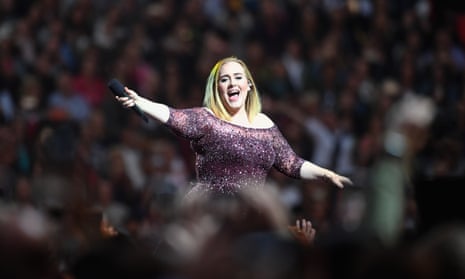The UK’s £4.5bn music industry is under threat because fans’ cash is being diverted from their favourite acts, as they fork out for tickets sold by touts at vast mark-ups, according to a survey.
The survey, released by anti-tout campaign group FanFair Alliance on Monday, found that two-thirds of respondents who had paid more than face value for a ticket on a resale site said they would attend fewer concerts in future, while half would spend less on recorded music.
Adam Webb, a FanFair Alliance campaigner, said the survey supported fears that touting was doing “considerable long-term damage” to the music industry, which supports 142,000 jobs, according to UK Music.
About 80% of more than 1,000 surveyed said secondary ticketing was a “rip off”, while 58% said they would support limiting resale prices to face value. “The message from this research appears to be pretty clear: UK audiences are fed up,” said Webb.
He said fans were not against all resale but that “the majority would like the option to resell a ticket for the price they paid for it, and they’re in favour of measures to curb mass-scale online ticket touting”.
The £1bn-a-year secondary ticketing industry, where websites offer a platform to resell music, theatre and sports tickets, is already being investigated by the Competition and Markets Authority (CMA) amid concern about the impact on fans and artists.
The government has brought forward legislation to ban the use of automated software known as “bots” to harvest tickets but has shied away from broader restrictions.
Evidence of fans’ growing frustration came as analysis of more than 20 gigs showed that resale was dominated by touts, rather than genuine fans who suddenly found they could not go to an event.
For a Jack Savoretti gig at Indigo at the O2 in London, 94% of tickets on the Ticketmaster-owned GetMeIn site were listed by professional ticket traders, as were 80% sold on eBay-owned StubHub.
Many of the tickets are listed at significant mark-ups, despite the fact that the gig is not sold out and face-value tickets were still available as of Thursday.
Both sites hosted listings by well-known professional traders, including Scotland-based Andrew Newman, identified by the Guardian last year as one of Britain’s most successful touts.
A gig by rock act Queens of the Stone Age at Wembley attracted similar attention, with 81% of StubHub’s listings attributed to professional ticket traders and 64% of GetMeIn’s.
A StubHub spokesperson said it had less than 1% of capacity at these venues, adding that some of its tickets were sold for less than the original price and that 40% of tickets sold via the site in the UK were at face value or below.
“The real problem is the lack of transparency in the primary market with the distinct lack of tickets made available to the general public,” said StubHub.
“We would like to see government bring forward rules that would mean that primary sellers have to list how many tickets they are actually listing for primary sale.”
While StubHub and GetMeIn publish information about who is selling tickets, Switzerland-based Viagogo does not.
The website has been criticised for selling tickets that resulted in fans being denied entry, profiting from charity gigs, and refusing to cooperate with a parliamentary investigation.
Analysis of its listings revealed that it advertised 916 tickets for one Lady Gaga concert, 674 for The Killers, 535 for Depeche Mode and 471 for Queens of the Stone Age.
But none of the listings contained any information about who sold the tickets, leaving fans in the dark about who they were buying from.

Comments (…)
Sign in or create your Guardian account to join the discussion